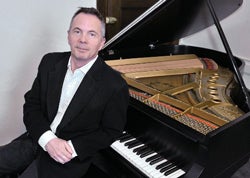launch
Music Chair Hits High Note
 photo: Roadell Hickman
photo: Roadell Hickman
David Ake still remembers the epiphany: A gray September afternoon his senior year of high school. Sunk in the orange beanbag chair of his suburban Chicago bedroom. Immersed in a live, improvised record by jazz pianist Keith Jarrett.
"I was transformed, absolutely transformed," says Ake. "What I heard in that performance—the freedom and the creativity—opened all these possibilities for what I could be, as a musician and as a person."
Ake later began writing his own music as a jazz performance major at University of Miami, and spent the next two years playing jazz piano in top clubs in Europe.
"I have been fortunate to play with some of the greatest jazz musicians in the world, and, sometimes, they're playing music that I composed," says Ake, PhD, who last year became chair of Case Western Reserve's music department.
He has recorded a dozen albums, several as both pianist and lead composer, including his latest, Bridges, an April 2013 release.
The album drew rave reviews and was included in year-end "Best of" lists by Baltimore magazine, All About Jazz and the Jazz Journalists Association. DownBeat magazine, the premier jazz publication, gave it 4.5 stars out of five.
Bridges was a reunion of sorts for Ake and some longtime friends. Ravi Coltrane, Peter Epstein, Ralph Alessi, Scott Colley and Mark Ferber—among the biggest names in jazz— gathered with Ake in a Manhattan studio and recorded the entire CD in just two days. They nailed some pieces in the first take.
Between Ake's first experience with Jarrett's albums and his move into academia, he continued as a professional jazz musician, first in Los Angeles and, later, New York.
A deep curiosity about how New York's splintered jazz scene mirrored the city's multicultural identity led him to pursue a doctorate in musicology from University of California, Los Angeles.
Ake spent 14 years at University of Nevada, Reno, before coming to Cleveland. The opportunity here allows him to be part of "one of the strongest musicology programs in the world," he says. An added bonus: Case Institute of Technology is his dad's alma mater [Theodore Ake (CIT '50)].
"And then to work with the students here. They're so focused and so smart and self-motivated," he says. "Most are double majors—music and something like biomedical engineering. They really are extraordinary."






